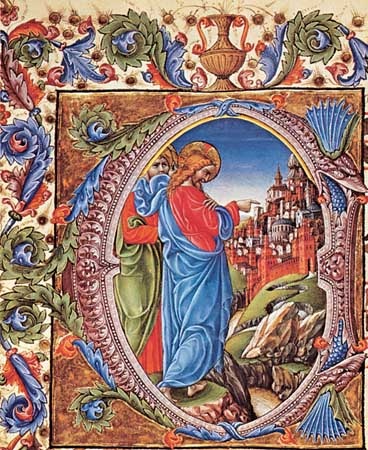logos
philosophy and theology
Greek“word,” “reason,” or “plan”plural logoi
in Greek (Greek religion) philosophy and theology, the divine reason implicit in the cosmos, ordering it and giving it form and meaning. Though the concept defined by the term logos is found in Greek, Indian, Egyptian, and Persian philosophical and theological systems, it became particularly significant in Christian writings and doctrines to describe or define the role of Jesus Christ as the principle of God active in the creation and the continuous structuring of the cosmos and in revealing the divine plan of salvation to man. It thus underlies the basic Christian doctrine of the preexistence of Jesus.
The idea of the logos in Greek thought harks back at least to the 6th-century-BC philosopher Heracleitus, who discerned in the cosmic process a logos analogous to the reasoning power in man. Later, the Stoics (Stoicism), philosophers who followed the teachings of the thinker Zeno of Citium (4th–3rd century BC), defined the logos as an active rational and spiritual principle that permeated all reality. They called the logos providence, nature, god, and the soul of the universe, which is composed of many seminal logoi that are contained in the universal logos. Philo of Alexandria (Philo Judaeus), a 1st-century-AD Jewish philosopher, taught that the logos was the intermediary between God and the cosmos, being both the agent of creation and the agent through which the human mind can apprehend and comprehend God. According to Philo and the Middle Platonists (Platonism), philosophers who interpreted in religious terms the teachings of the 4th-century-BC Greek master philosopher Plato, the logos was both immanent in the world and at the same time the transcendent divine mind.
 In the first chapter of The Gospel According to John (John, Gospel According to), Jesus Christ (patristic literature) is identified as “the Word” (Greek logos) incarnated, or made flesh. This identification of Jesus with the logos is based on Old Testament concepts of revelation, such as occurs in the frequently used phrase “the Word of the Lord”—which connoted ideas of God's activity and power—and the Jewish view that Wisdom is the divine agent that draws man to God and is identified with the word of God. The author of The Gospel According to John used this philosophical expression, which easily would be recognizable to readers in the Hellenistic (Greek cultural) world, to emphasize the redemptive character of the person of Christ, whom the author describes as “the way, and the truth, and the life.” Just as the Jews had viewed the Torah (the Law) as preexistent with God, so also the author of John viewed Jesus, but Jesus came to be regarded as the personified source of life and illumination of mankind. The Evangelist interprets the logos as inseparable from the person of Jesus and does not simply imply that the logos is the revelation that Jesus proclaims.
In the first chapter of The Gospel According to John (John, Gospel According to), Jesus Christ (patristic literature) is identified as “the Word” (Greek logos) incarnated, or made flesh. This identification of Jesus with the logos is based on Old Testament concepts of revelation, such as occurs in the frequently used phrase “the Word of the Lord”—which connoted ideas of God's activity and power—and the Jewish view that Wisdom is the divine agent that draws man to God and is identified with the word of God. The author of The Gospel According to John used this philosophical expression, which easily would be recognizable to readers in the Hellenistic (Greek cultural) world, to emphasize the redemptive character of the person of Christ, whom the author describes as “the way, and the truth, and the life.” Just as the Jews had viewed the Torah (the Law) as preexistent with God, so also the author of John viewed Jesus, but Jesus came to be regarded as the personified source of life and illumination of mankind. The Evangelist interprets the logos as inseparable from the person of Jesus and does not simply imply that the logos is the revelation that Jesus proclaims.The identification of Jesus with the logos, which is implied in various places in the New Testament but stated specifically in the Fourth Gospel, was further developed in the early church but more on the basis of Greek philosophical ideas than on Old Testament motifs. This development was dictated by attempts made by early Christian theologians and apologists to express the Christian faith in terms that would be intelligible to the Hellenistic world and to impress their hearers with the view that Christianity was superior to, or heir to, all that was best in pagan philosophy. Thus, in their apologies and polemical works, the early Christian Fathers stated that Christ as the preexistent logos (1) reveals the Father to mankind and is the subject of the Old Testament manifestations of God; (2) is the divine reason in which the whole human race shares, so that the 6th-century-BC philosopher and others who lived with reason were Christians before Christ; and (3) is the divine will and word by which the worlds were framed.
- Marcus Loew
- Marcus Manilius
- Marcus Minucius Felix
- Marcus Møller Thrane
- Marcus Pacuvius
- Marcus Porcius Cato
- Marcus, Rudolph A.
- Marcus, Siegfried
- Marcus, Stanley
- Marcus Terentius Varro
- Marcus Tullius Cicero
- Marcus Valerius Messalla Corvinus
- Marcus Verrius Flaccus
- Marcus Vipsanius Agrippa
- Marcus Whitman
- Marcy, Mount
- Marcy, William L
- Mardals Falls
- Mardaïte
- Mar del Plata
- Marden, Brice
- Mardersteig, Giovanni
- Mardi Gras
- Mardin
- Mardonius